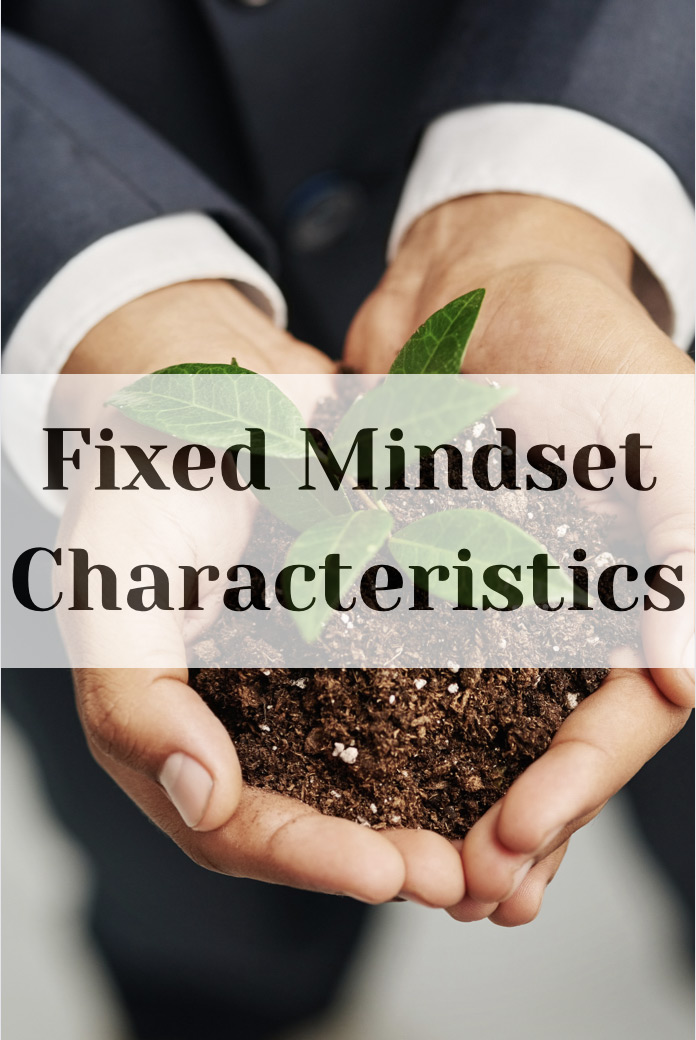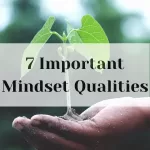Fixed Mindset Characteristics

Having the right mindset is essential for all aspects of your life but being aware of what fixed mindset characteristics are and how to avoid them, can put you ahead of the game.
Understanding the key fixed mindset characteristics allows you to focus on areas to improve and build a growth mindset.
This post is about fixed mindset characteristics.

What is a fixed mindset?
Imagine you’re at a party and you meet someone who’s accomplished and smart. You might think they were born with all their abilities and feel that you can never be as smart as them. That’s what a fixed mindset is.
A fixed mindset is when you believe that your abilities and traits are unchangeable and that you’re either naturally good at something or not. But this kind of thinking can hold you back from reaching your potential and limit personal growth.
On the other hand, a growth mindset is when you believe that your abilities can be developed through dedication and hard work. You recognize that you might not be good at something yet, but you can improve with practice.
The good news is that you can develop a growth mindset by challenging your beliefs and trying new things. Remember, even the greatest minds started as beginners, and with effort and practice, you can achieve anything you set your mind to.

Signs and symptoms of a fixed mindset
To identify whether you have a fixed mindset, there are some indicators to look out for. One sign is avoiding challenges as you might fear failure or lack confidence in your ability to learn and improve. Another indication is giving up quickly after trying something once, which suggests you might be stuck in a fixed mindset. By contrast, a growth mindset encourages continuous learning and persistence in the face of failure.
A third indication is a resistance to feedback or getting defensive when someone criticizes you. This suggests that you are not open to learning and developing your skills. However, it’s important to remember that everyone has fixed mindset tendencies occasionally, and the key is to recognize them and work towards overcoming them.
To develop a growth mindset, try setting small challenges for yourself, exploring new hobbies, and practising mindfulness. With time and effort, you can shift your mindset from fixed to growth and become more open to learning and personal development.
Characteristics
People with a fixed mindset fear failure and give up easily when faced with challenges. They focus on receiving validation for their innate abilities rather than their effort.
Here are some of the main fixed mindset characteristics:
Belief in innate abilities
People with a fixed mindset tend to believe that their abilities, intelligence, and talents are predetermined and cannot be changed. They may believe that some people are simply born with natural talents and abilities, while others are not.
Fear of failure
Those with a fixed mindset may be more fearful of failure, as they see it as a reflection of their personal worth. They may avoid challenging themselves or taking risks in order to protect their self-image.
Tendency to give up easily
When faced with a challenge or obstacle, people with a fixed mindset may give up more easily than those with a growth mindset. They may feel discouraged or overwhelmed, believing that their abilities are not up to the task.
Focus on validation
People with a fixed mindset may be more focused on receiving validation and praise for their innate abilities rather than their effort. They may seek out activities where they can easily demonstrate their natural talents rather than challenge themselves to learn and grow.
Resistance to feedback
Individuals with a fixed mindset may be resistant to feedback, as it challenges their belief in their innate abilities. They may see criticism as a personal attack rather than an opportunity for growth.
Negative self-talk
Those with a fixed mindset may engage in negative self-talk, believing that their abilities are fixed and that they cannot improve. They may use phrases like “I’m just not good at this” or “I’ll never be able to do it.”

Lack of resilience
Individuals with a fixed mindset may struggle to bounce back from setbacks and failures, as they view these as reflections of their inherent limitations. They may give up easily and avoid taking on new challenges,
They may view others as threats to their success and become overly concerned with being the best, which can limit their ability to collaborate and learn from others which can limit their ability to grow and develop over time.
Rigidity in thinking
Those with a fixed mindset can have a rigid approach to life, believing their abilities are unchangeable. This can lead to a limited worldview and avoidance of new ideas, hindering growth and development.
Focus on comparison
People with a fixed mindset focus on comparison and competition, tying their success to innate abilities and traits. To overcome these limiting beliefs and behaviours, it’s important to understand these characteristics and adopt a growth mindset that fosters personal growth and development.

Consequences
A fixed mindset can have some serious negative consequences.
If you believe that your abilities and traits are fixed, you’re less likely to take risks or try new things.
This can hold you back from reaching your full potential and achieving your goals.
You might also feel like a failure or become easily discouraged when faced with setbacks or challenges.
And if you’re resistant to feedback, you could miss out on valuable opportunities to learn and grow.
In the long run, a fixed mindset can limit your personal growth, negatively affect your relationships, and even impact your mental health.
So, it’s important to be aware of your mindset and work towards developing a growth mindset instead. This can help you to embrace challenges, learn from failures, and achieve your full potential.
Limits growth
Those with a fixed mindset believe that their abilities are set in stone, which can limit their potential for growth and development.
Hinders learning
A fixed mindset can also hinder a person’s ability to learn from mistakes or new experiences, as they may feel discouraged or ashamed by failure.
Creates resistance to change
People with a fixed mindset may resist change, as it challenges their belief in their innate abilities and can be seen as a threat to their sense of identity.
Increases fear of failure
Because those with a fixed mindset place a high value on their innate abilities, they may become more fearful of failure, as it could be seen as a reflection of their personal worth.
Decreases resilience
A fixed mindset can reduce resilience and hinder bouncing back from setbacks, as failures may be seen as a result of inherent limitations. This mindset can limit growth, hinder learning, and create resistance to change, while increasing fear of failure. Therefore, individuals should aim to adopt a growth mindset to achieve their full potential.
Why you should avoid a fixed mindset
Avoiding a fixed mindset is important because it can limit personal growth, hinder career and academic success, and impact overall well-being and satisfaction.
Here are some of the reasons why avoiding a fixed mindset is important:
Encourages personal growth
A fixed mindset can create resistance to change and fear of new challenges, limiting personal growth and development. However, avoiding a fixed mindset allows individuals to embrace change and new experiences, developing new skills and abilities and reaching their full potential.
Supports career and academic success
A fixed mindset can restrict creativity, innovation, and problem-solving skills, which are essential for success in work and academics. However, avoiding a fixed mindset enables individuals to be more receptive to learning, experimentation, and taking risks, leading to greater achievement and success in their careers and academics.

Improves well-being and satisfaction
Individuals with a fixed mindset often feel stressed and anxious, since they believe their worth is linked to their performance and constantly seek validation and recognition from others. However, avoiding a fixed mindset allows people to concentrate on their personal growth and development, rather than external validation, resulting in improved well-being and satisfaction.
Promotes a positive outlook
A fixed mindset can lead to a negative, defeatist attitude, as individuals believe that their abilities and traits are set and cannot be changed. By avoiding a fixed mindset, individuals can adopt a positive, proactive outlook, and view challenges and failures as opportunities for growth and development.
Supports creativity and innovation
A fixed mindset may limit creativity and innovation, as individuals become rigid in their thinking and avoid new experiences and ideas. To enhance creativity and innovation, individuals should avoid a fixed mindset and be open to exploring new ideas and perspectives.
Avoiding a fixed mindset is vital, as it promotes personal growth, supports career and academic success, improves well-being and satisfaction, and promotes a positive outlook. By embracing a growth mindset and believing in the power of hard work and dedication, individuals can reach their full potential and lead fulfilling, successful lives.
Overcome a fixed mindset
Recognise and acknowledge the fixed mindset
The first step to overcoming a fixed mindset is recognising that it exists. Acknowledge that your abilities and talents are not predetermined and can be developed.
Embrace challenges
People with a fixed mindset tend to avoid challenges, but embracing challenges is essential to developing a growth mindset. Challenge yourself to learn new things, take risks, and step out of your comfort zone.
Cultivate a positive attitude
Adopt a positive attitude towards challenges and failures. Instead of fearing failure, view it as an opportunity to learn and grow.
Focus on the process
Shift your focus from the end result to the process. Celebrate small successes along the way, and focus on the effort and progress you’re making rather than solely on the outcome.
Emphasize growth and improvement
Cultivate a mindset that emphasizes growth and improvement. Instead of seeking validation for innate abilities, focus on developing new skills and talents.
Practice self-compassion
Be kind to yourself and practice self-compassion. Recognize that everyone experiences setbacks and failures, and be gentle with yourself when things don’t go as planned.
Seek feedback
Be open to feedback, even if it’s critical. Feedback can help you identify areas where you can improve and grow.
By adopting a growth mindset and taking these actions, you can overcome a fixed mindset and develop new skills and talents, achieving personal and professional success.
Applying the theory
So, we’ve talked about what a fixed mindset is and why it’s important to develop a growth mindset instead. But how can we apply this theory in our everyday lives?
Well, there are a few practical applications of mindset theory that can help us to develop a growth mindset and achieve our goals.
For example, one application is to focus on process over outcome. Instead of just worrying about whether or not you achieve a certain goal, focus on the steps you’re taking to get there and the progress you’re making along the way.
Another application is to embrace failure as a learning opportunity. Instead of seeing failure as a reflection of your abilities, see it as a chance to learn and improve for next time.
A third application is to practice mindfulness and self-compassion. This can help you to be more aware of your thoughts and emotions, and to treat yourself with kindness and understanding.
You can also apply mindset theory in your relationships by practising active listening, seeking out feedback, and being open to learning and growth.
In the workplace, mindset theory can be applied by encouraging a culture of learning and growth, providing opportunities for skill development, and valuing effort and progress over innate talent.
Overall, the practical applications of mindset theory are about shifting our focus from fixed traits to growth and development and embracing challenges and failures as opportunities to learn and improve.
This post is about fixed mindset characteristics.
Share this post: on Twitter on Facebook on Google+


